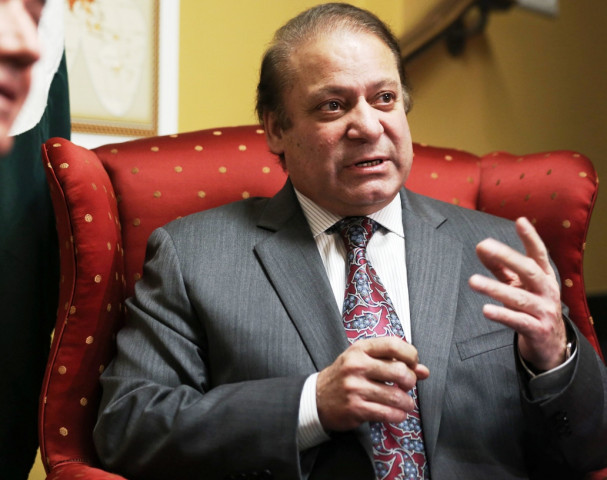Nawaz takes up post-war ties with Obama
Nawaz seeks to build a new type of post-Afghanistan war relationship as he presses for an end to drone strikes.

Prime Minister Nawaz Sharif in the US. PHOTO: AFP
In a nod to the fading of tensions since the 2011 raid that killed Osama bin Laden, President Barack Obama's administration has moved to release more than $300 million in blocked security assistance to Pakistan.
But tensions remain over the US campaign of drone attacks aimed at extremists deep inside the country's lawless areas. Nawaz urged an end to the strikes, which a new Amnesty International report said may violate international law by killing civilians.
But Nawaz, calling for a fresh partnership with the United States on the eve of his meeting with Obama, largely steered clear of the past narrative of outside interference that has jarred relations.
"It is my endeavor to approach this important relationship with an open and fresh mind, leaving behind the baggage of trust deficit and mutual suspicions," Nawaz said at the US Institute of Peace.
"The greatest challenge to Pakistan comes from terrorism and extremism," Nawaz said, calling his nation "a major victim" of a decade of attacks that have killed more than 40,000 people.
White House spokesman Jay Carney said Obama hoped to use the meeting with Nawaz to promote "a stable, secure and prosperous Pakistan that is contributing to regional and international security and prosperity."
The White House meeting is Nawaz's first since he swept to power in May elections. It comes a year before the United States plans to pull out combat troops from Afghanistan, ending its longest war launched after the attacks of September 11, 2001.
The Afghan war instantly transformed Pakistan into a sometimes reluctant US war partner, with the then military government agreeing to help Washington overthrow Islamabad's erstwhile Taliban allies.
In a message sure to be welcomed at the White House, Nawaz said that his country supported a "peaceful, stable and unified Afghanistan" - whose leaders often accuse Pakistan's powerful spy network of covertly supporting the Taliban.
Nawaz said he has assured Afghan President Hamid Karzai "that we wish neither to interfere in Afghanistan's internal affairs, nor do we have any favourites."
Obama is expected to sound out Nawaz for ideas on reaching an elusive peace agreement involving the Taliban, as well as practical support for pulling out most of the 50,000 US troops in Afghanistan.
Cameron Munter, the US ambassador to Pakistan until last year, said that both sides wanted a more stable relationship that did not just revolve around crises.
Nawaz has projected himself as "modern and moderate" and has been upfront about his challenges, Munter said.
"He's tried to say we can put this back on a good footing (and) trying to keep expectations fairly low."
Robert Hathaway, director of the Asia program at the Woodrow Wilson International Center for Scholars, said that Nawaz had "no alternative" but to raise drones due to the sweeping opposition inside Pakistan to the attacks.
"By the same token, I think it's unrealistic that Obama is going to have any real give on this subject so long as the insurgents continue to find a sanctuary in Pakistan and then slip across the border to kill Americans and Nato forces," Hathaway said.
Amnesty International, in its report Tuesday, documented cases in which it said civilians were clearly killed, including an October 2012 strike that ripped apart a 68-year-old grandmother as she picked vegetables.
White House spokesman Jay Carney said that the United States exercised "extraordinary care" and was "choosing the course of action least likely to result in the loss of life."
Nawaz has also pledged to work for better relations with historical rival India, which has pressed Pakistan to take action against extremists linked to the bloody 2008 siege of Mumbai.



1724319076-0/Untitled-design-(5)1724319076-0-208x130.webp)















COMMENTS
Comments are moderated and generally will be posted if they are on-topic and not abusive.
For more information, please see our Comments FAQ